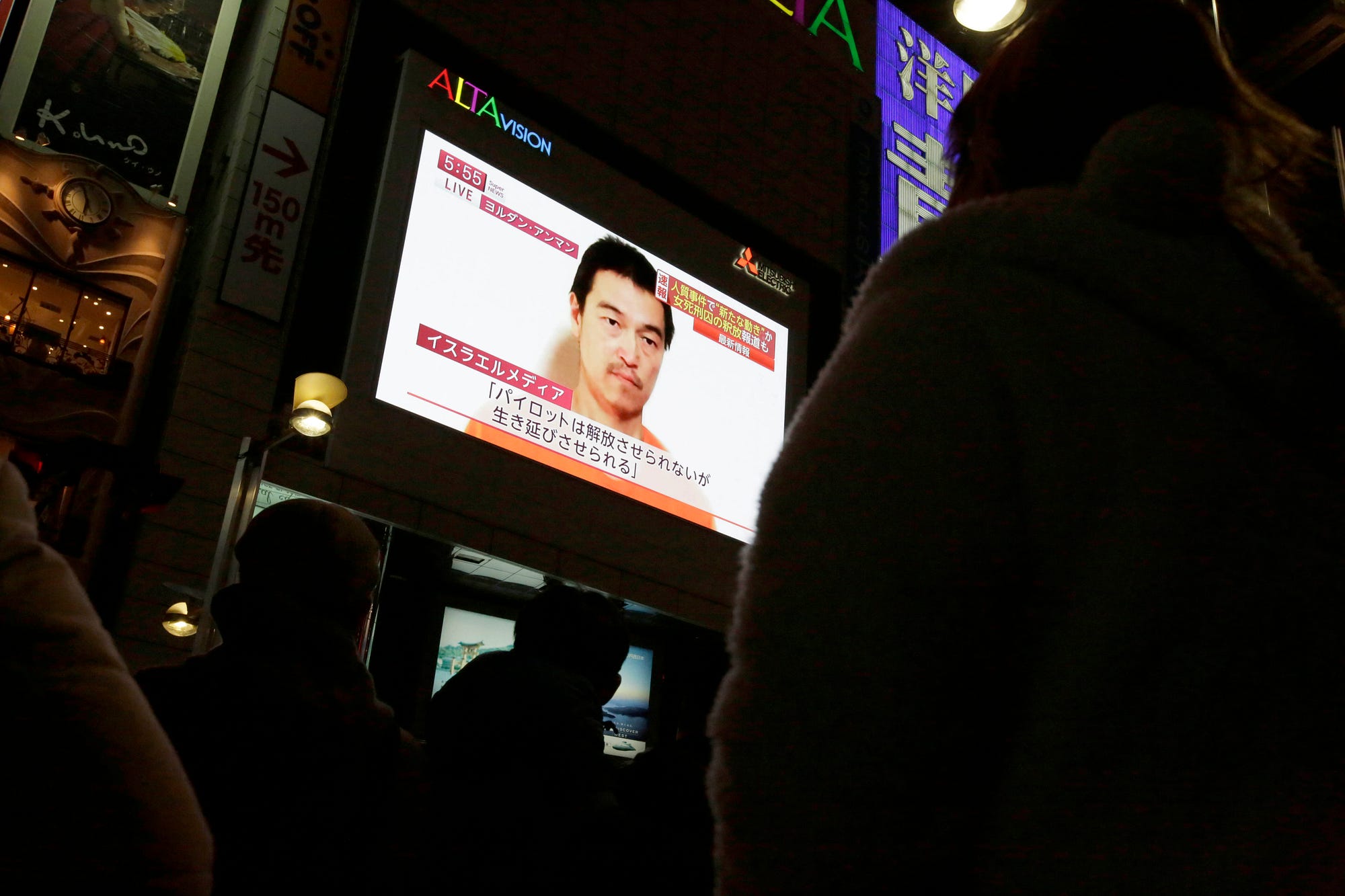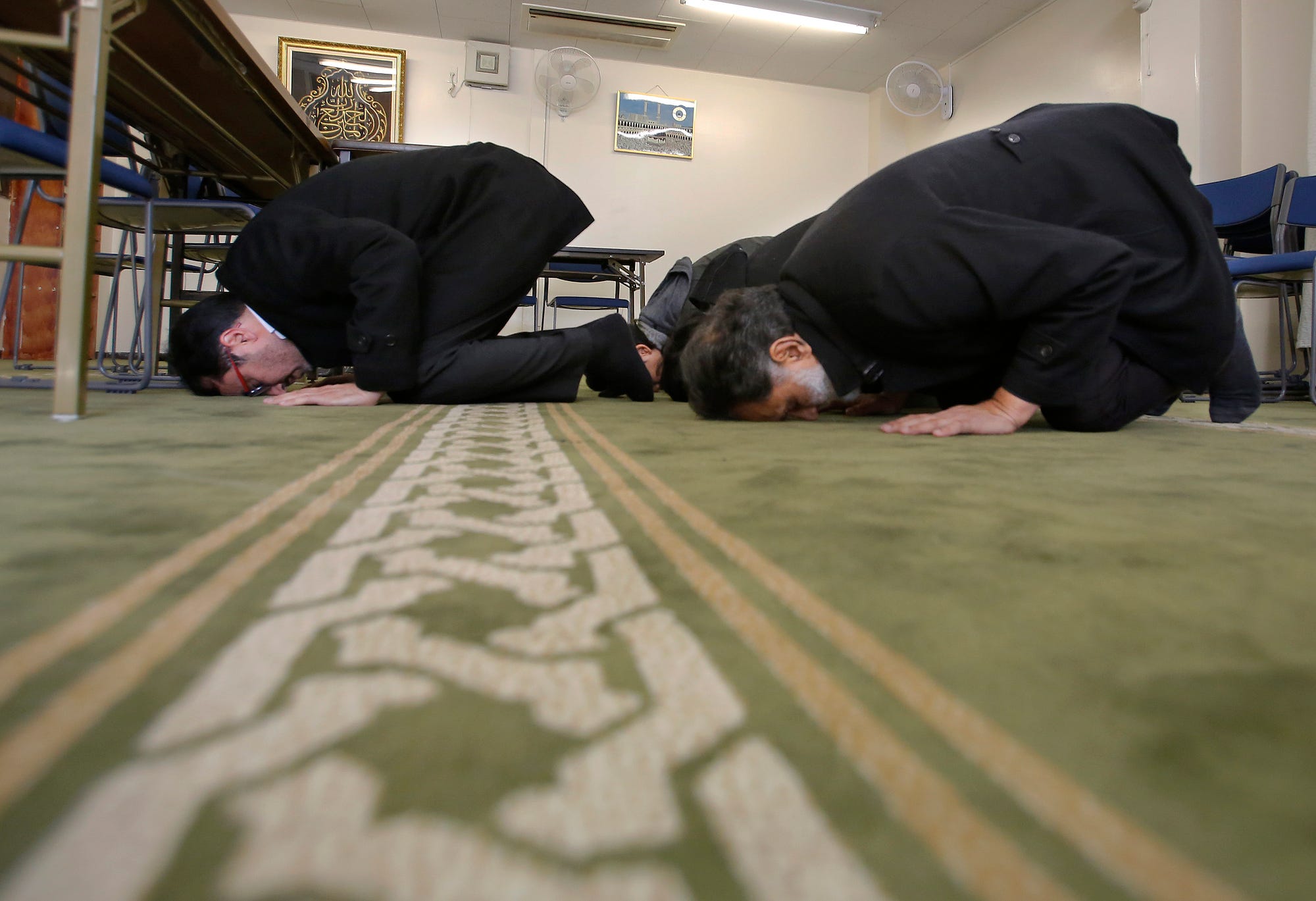By KEVIN KNODELL and JAMES SIMPSON
Now Amman drops bombs while Tokyo debates military reform
Moath Al Kasasbeh knew he was going to die.
The 26-year-old Jordanian fighter pilot—a prisoner of Islamic State since Christmas—said he believed the militants would kill him when the group’s propaganda wing interviewed him for its English-language magazine Dabiq.
On Feb. 3, Islamic State released a video of its followers burning Kasasbeh alive inside a metal cage. As flames engulf the young pilot, the militants pour debris on the cage, and a bulldozer flattens it with Kasasbeh’s body still inside.
The image of Islamic State burning a fellow Muslim to death—as part of what the group claims is a holy quest to protect and spread Islam—has sparked both disbelief and outrage. The Jordanian government is now openly waging an all-out war against the jihadi group.
On Feb. 5, Jordanian warplanes bombed Islamic State in Syria in revenge strikes.
“[King Abdullah of Jordan] has promised, before God and the Jordanian people, that we will burn Islamic State as they burned our martyr,” Ehab Al Kasasbeh, the pilot’s cousin, said according to The Washington Post.
Days prior to Kasasbeh’s death, the Islamists executed Japanese citizens Kenji Goto and Haruna Yukawa.
In Japan, the death of its citizens opened the public’s eyes to the terror group. For the first time since the country’s foray into Iraq in 2004, Japan seems to have a stake in events in the Middle East.
Kasasbeh was a deeply religious person. He completed the Hajj with his family and got married shortly before his fateful mission. Kasasbeh’s F-16 fighter jet crashed during a mission to Syria in December.
The killing follows recent crimes like the Peshawar school massacre in Pakistan, and Boko Haram’s massacre of 2,000 Nigerians that prompted Muslim activists around the world to condemn extremist violence.
But it’s not just that Islamic State executed a Muslim that’s upsetting in Jordan and the wider Middle East—they’ve executed thousands of Syrian and Iraqi soldiers and civilians. It’s the method of his death.
The theatrical nature of the latest execution marks a new level of barbarism that many Muslims say is actually banned by their religion.
According to the Sahih Al Bukhari—one of the six major Hadith collections of Sunni Islam—using fire to kill a person is forbidden. The text says that the Prophet Muhammad decreed that “no one other than Allah may use fire for punishment.”
Twitter users in the Middle East responded swiftly and loudly.
It’s possible militants killed Kasasbeh on Jan. 3—a whole month before the video’s release. The level of production on the video suggests it happened awhile ago. And that’s kind of a big deal.
Because for the past month, the group’s official position has been that they would release him, if Jordan released prisoners held on terrorism charges.
Islamic State previously called for the release of Sajida Al Rishawi—an Iraqi woman imprisoned in Jordan for her role in a 2005 bombing that killed 60 people. Jordanian officials discussed the possibility of going through with the swap.
It fell through because Islamic State wouldn’t provide Kasasbeh’s proof of life. If Kasasbeh has been dead for a whole month, that means the jihadi group’s leadership lied the entire time—and never intended to return the pilot alive.
The Jordanian public has been deeply divided over the war in Syria. News of the airman’s abduction lead to protests against the Jordanian royal family’s support for the coalition. Protests are a very rare occurrence in the country.
Many people were critical of the intervention to begin with, and strongly against risking the lives of Jordanian troops. Kasasbeh’s father was vehemently against his son going to fight against fellow Sunni Muslims.
“I wasn’t OK with it at all. And all Jordanians strongly condemn our participation in the coalition,” his father told NPR. “Our army is for defending Jordan. It’s not supposed to spread throughout the world like American forces.”
He directly appealed to Islamic State for mercy, begging for his son’s safe return. Many Jordanians seemed to hope their government would release Rishawi, get their pilot back and disengage from the war.
Since the release of the gruesome footage, there was a new round of rallies in Jordan. But this time, they weren’t calling for an end to their war with Islamic State.
Now many Jordanian activists are calling for an escalation of the campaign.
Jordan-based AFP journalist Randa Habib tweeted about the county’s change in mood:
“The revenge will be as big as the calamity that has hit Jordan,” declared Jordanian army spokesman Col. Mamdouh Al Ameri in a televised statement.
Jordan executed Rishawi and a second prisoner in retribution for the attack. But some activists warn that it could play into Islamic State’s propaganda strategy.
The jihadi group recruits fighters by demonstrating it has momentum on its side through capturing territory and winning battles.
But Islamic State’s military successes have stalled in the face of Kurdish offensives in the Syrian city of Kobani and near Mosul, Iraq. Faced with these defeats, executions serve to broadcast the group’s commitment to its cause. Provoking executions of prisoners in Jordan could also create martyrs—handing the group a rallying call for further recruits.
 Many Muslims on both sides of the conflict see this war as an epic struggle to define their religion and culture. There will no doubt be more martyrs before it’s over.
Many Muslims on both sides of the conflict see this war as an epic struggle to define their religion and culture. There will no doubt be more martyrs before it’s over.
The Japanese public is largely outraged at the deaths of journalist Kenji Goto and adventurer Haruna Yukawa. The killings are seemingly without meaning.
Goto devoted his life to report on the plight of children living in the worst conditions the world has to offer. Yukawa traveled to Syria to fight in the war, in an apparent attempt to give his isolated life a sense of purpose.
Islamic State kidnapped Yukawa in October. Goto then traveled to Syria to seek Yukawa’s release, before he was also kidnapped. The journalist’s wife received 10 emails demanding a $1.7 million ransom. Working behind the scenes, the government attempted to keep the negotiations secret for fear of provoking Goto’s murder.
On Jan. 18, as part of a six-day tour of the Middle East, Prime Minister Shinzo Abe pledged $200 million in aid to the countries handling the humanitarian fallout from Islamic State’s chaotic rise.
Two days later, the man known as “Jihadi John” paraded Goto and Yukawa in orange jumpsuits in a video released on the Internet. The militants demanded $100 million per prisoner—totaling the same amount pledged by Abe.
Jihadi John’s 72-hour deadline came to an end without payment of the ransom. A video then circulated online showing a photograph of Goto holding a still image of Yukawa’s decapitated corpse.
In audio dubbed over the still image, Goto gave a statement from his captors offering hope of an exchange—himself for Sajida Al Rishawi, a failed suicide bomber held in Jordan since 2005. The journalist reported that he had 72 hours to live.
For a moment, it seemed like Goto could make it out alive.
Tokyo worked with the Jordanian government to attempt a deal. Meanwhile, Goto appeared to be in the middle of a struggle within Islamic State. New demands, a new deadline, a change of heart—it all seemed unlike the resolute barbarity the public had come to expect.
The 72 hours passed again without progress. On Jan. 27, Goto’s captors uploaded a new ransom video. This time, Goto displayed a photograph of Jordanian pilot Kasasbeh. The journalist reported he had just 24 hours to live, and that the pilot would also die if Jordan did not release Rishawi.
Tokyo and Amman worked through Iraqi tribal leaders to try to secure the two hostages. But on Jan. 31, Japan’s deputy foreign minister told reporters that they were “deadlocked.”
Islamic State beheaded Goto and threatened further attacks against Japan and its people.
 The impact was gut-wrenching. Some, like former diplomat Kunihiko Miyake, are calling it “Japan’s 9/11.”
The impact was gut-wrenching. Some, like former diplomat Kunihiko Miyake, are calling it “Japan’s 9/11.”
But Japan’s response is decidedly more measured than the U.S. response to 9/11—and Jordan’s response to Kasasbeh’s execution. But Japan is a very different country, and much further away. Despite Jihadi John’s threats against all Japanese citizens, it’s unlikely Japan will experience the homegrown IS-inspired terrorism demonstrated in France, Australia and other nations.
Japan lacks melting-pot demographics. Few Japanese are also worried about their personal safety in the wake of Goto’s death.
Rather, they’re concerned about the safety of Japanese citizens working in the Middle East. Among reports showing the tearful grief of Goto’s mother and Yukawa’s father, the country’s news media reported that the government sent emails to Japanese workers in the region warning them of the heightened threat.
Abe pledged work with the international community to bring the killers to justice. He promised to continue Japan’s longstanding tradition of providing financial aid for peacekeeping missions within the region.
Security and military experts like Takashi Kawakami of Takushoku University stressed the need to address the lack of intelligence during the crisis.
The government dispatched military attaches to its embassies to improve intelligence sharing. Japan doesn’t have a foreign secret intelligence collection agency comparable to the CIA or MI6—nor does it seem likely to build one.
But it’s unlikely the government could have done anything to save Goto and Yukawa. With the knowledge that Kasasbeh was already dead when Islamic State held up the hope of his release, there’s no reason to believe that the captors showed Goto or Yukawa any more mercy.
Nor were negotiators helped by shifting demands, unclear deadlines and a possible power struggle within the militant group.
The majority of Japanese are angry at Islamic State, and are resolute about the need to counter the group with financial support to the region. But this stops far short of military involvement.
Part of Abe’s broader political goals is revising the constitution, allowing Tokyo to conduct military action in support of its allies—known in Japan as “collective self-defense.”
This is highly controversial in Japan, whose people prize the pacifistic commitments in its post-war constitution.
Abe steered clear of the constitutional reform problem during comments to the press. Japan’s chief cabinet secretary even told reporters that Abe would not link the hostage crisis to collective self-defense or constitutional revision.
This didn’t last very long.
On Feb. 2, the prime minister told the Upper House Budget Committee that amending Article 9 of the constitution, which prohibits the use of force in international disputes, was part of the government’s “duty ofprotecting the lives and assets of Japanese citizens.”
Abe’s cabinet previously floated the idea of allowing Japanese soldiers to conduct “police action” when the host country consents. This proposal would allow the military to rescue Japanese citizens abroad.
At least on paper. Besides huge intelligence obstacles, the Japan Self-Defense Forces lack power projection, equipment and training for such ambitious missions.
It’s also unclear how such a raid would unfold in Islamic State-controlled territories—or in other war zones. It’s also unlikely Abe will find widespread support in Japan for reforming the constitution.
No comments:
Post a Comment